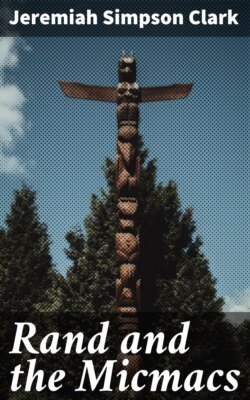Читать книгу Rand and the Micmacs - Jeremiah Simpson Clark - Страница 3
На сайте Литреса книга снята с продажи.
ОглавлениеIntroduction.
Table of Contents
By Rev. Robert Murray, D.D.
(Editor of Presbyterian Witness.)
Table of Contents
Dr. Rand was a man of rare genius and high attainments. It would be a wrong to him, to the country, and to the Church of Christ to allow his name to pass into oblivion. I am grateful to Mr. Clark for his highly creditable effort to do some justice to the character and work of a truly good, devoted, brilliant and scholarly Christian man.
My own acquaintance with Silas Tertius Rand extended over a period of more than thirty years. He attracted my attention and admiration when I came to this city long ago, an eager student of books and men. Rand was then in his early prime, tall, erect, lithe; never well-dressed; always notable. His features were regular; his forehead was lofty; his eyes were steel-grey and keen, and his look very kindly. He had abundance of dark wavy hair. While speaking, his gestures were perfectly natural and graceful. He had a melodious voice, clear, easily modulated to any key, and easily reaching any audience. His sentences were rhythmic, and rose and fell on the delighted ear with fitting cadence. He was a born orator, though utterly unconscious of the fact. Indeed his unconsciousness was one of the charms of his praying, his preaching and his speaking. His mind was full of his subject and in complete sympathy with his audience, whom he usually held spell-bound.
I never thought of Dr. Rand as growing old, though the last time he spent half an hour with me his locks were thin and grey, his eyes were dim, his forehead deeply furrowed, and his speech less clear than of old, because the “grinders were few,” and he had reached or passed beyond his fourscore years. He was wont to tell of his work among the Indians and for them, and it was my pleasant duty to repeat the story as best I could to my readers.
He was a poet; and he was wont to honor me with the perusal of his poems, Latin as well as English, before they were in type; and I liked them well, and like them still. His Latin translations show marvellous aptitude and resource. Some are worthy of the poet-saints of the Middle Ages who breathed their fears, their faith, and their sorrows into lyrics that cannot die.
His life-work was to master the Micmac language, to find his way to the hearts of the poor children of the forest, and to tell them the story of the Gospel in its simplicity. He made the language his own; he gathered the traditions of the Indians and learned their ways; and in many instances found his way to their hearts. He not only translated portions of the New Testament and Psalms into Micmac, but prepared a complete vocabulary of the language. This work and his Bible translations are in print, and may yet be found useful.
As to his success as a missionary among the Indians, it is not for me to speak. This I may say: Dr. Rand was wont to go among the Indians from camp to camp, telling them the story of redeeming love and pointing them to the “Lamb of God.” He had won the confidence of many. He had access to their minds and hearts, and he was fully convinced that not a few had become sincere Christians. He did not ask them to sever their connection with the Church of Rome; he asked them simply to follow Christ. One brilliant convert he had—a very able man, Ben Christmas. But strong drink ruined this poor Indian so far as this life was concerned. I believe he died a humble penitent.
The Micmac Mission is now seemingly forgotten. It was never well organized, never adequately supported. Can it be revived? Where is Dr. Rand’s successor? Should the Lord call any of our young earnest and devoted Baptist brethren to this work the new missionary ought to have at his back the whole influence, the spiritual and material resources, of the denomination. The work could now be conducted much more advantageously than when Dr. Rand grappled with it. I am sure the Christian community would hail with pleasure a revival of the Indian wigwam enterprise.
I may add that Dr. Rand was one of the few men I have known who seemed to be on terms of reverential intimacy with the blessed Lord and Master of us all. When praying he knew and felt that the Lord was listening. To him there was reality in all acts of worship, and he helped others to realize the presence of God. There was no hard, high, dead wall between him and the Father, Son and Holy Spirit. As he advanced in years he dropped the censoriousness in which he sometimes indulged in earlier years. A man like Dr. Rand is a gift from God, for which any community ought to be grateful; and the remembrance of him ought to be lovingly cherished.
ROBERT MURRAY.
Halifax, Nov. 1, 1899.
